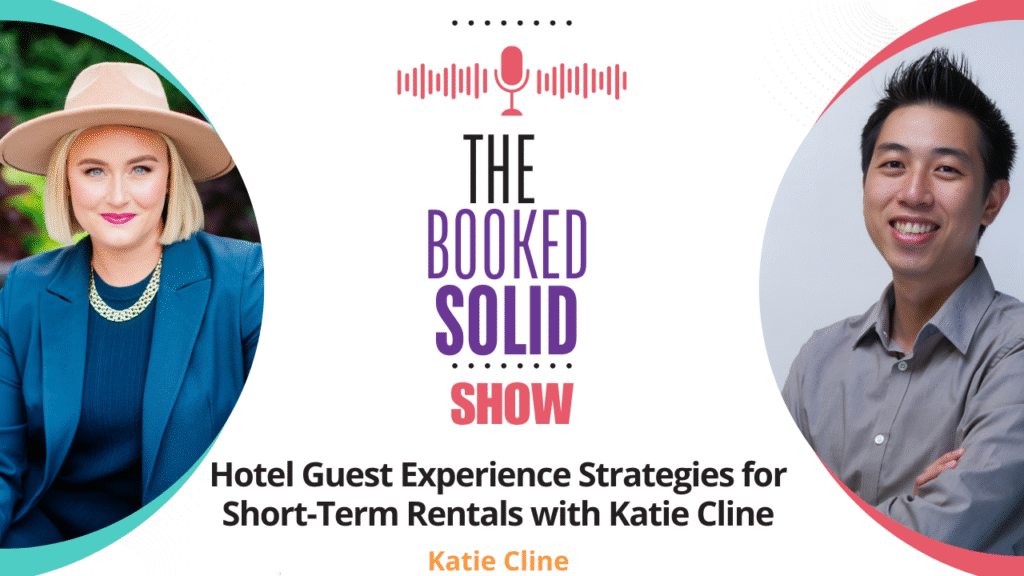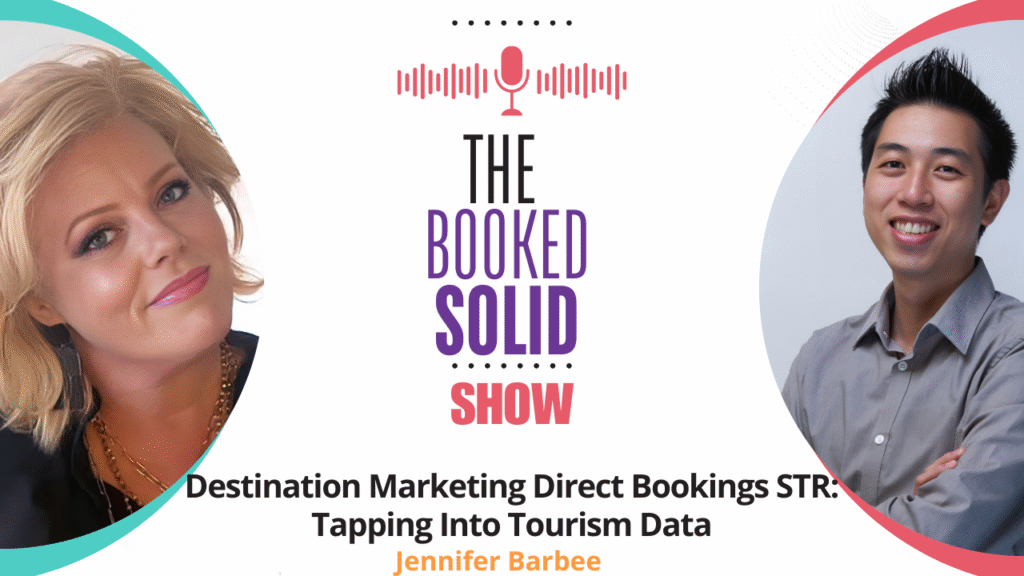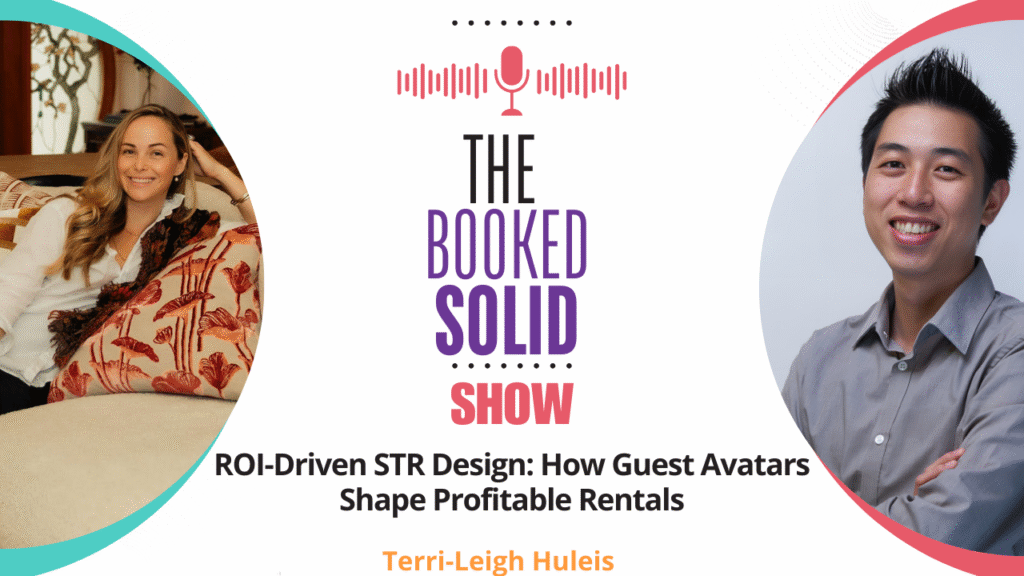Hotel Guest Experience Strategies for Short-Term Rentals with Katie Cline
“The first 10 minutes of a guest’s stay set the tone for everything that follows.” That single insight from luxury hotel research changed how Katie Cline operates her short-term rentals, and it might change how you think about yours, too. In this episode of Booked Solid, Katie sits down with Gil to share what years inside the boardrooms of Ritz-Carlton, W Hotels, and St. Regis taught her about hospitality, and how she now applies those five-star principles to her growing portfolio of vacation rentals in upstate New York. From the psychology of confirmation bias to why your welcome note probably shouldn’t include the guest’s name, this conversation covers the small, often free gestures that turn first-time guests into repeat bookers. Whether you manage one property or forty, Katie’s hotel guest experience strategies for short-term rentals will give you a fresh perspective on how to serve your guests and strengthen your brand. Summary and Highlights 👤 Meet Katie Cline Katie Cline is an award-winning publicist, hospitality veteran, and short-term rental operator. She led global PR and communications for iconic hotel brands, including The Ritz-Carlton, W Hotels, St. Regis, and The Luxury Collection in both New York and London. Today, she hosts two podcasts — Second Home First, focused on helping people turn vacation homes into wealth-building investments, and Suite Success: Masters of Hospitality, a Hospitality.FM original, where she interviews the brightest minds in the hotel and hospitality industry. Katie owns and operates three short-term rental properties in upstate New York — Trout Landing (near Lake George), Gallant Fox (in Saratoga Springs), and The Lazy Oar (on Seneca Lake) — and co-hosts a fourth. She also publishes a free weekly newsletter at BuyYourSecondHomeFirst.com, helping readers turn vacation home ownership into a practical strategy for building long-term wealth. ✨ The First 10 Minutes That Make or Break Your Guest’s Stay One of the most memorable takeaways from this episode comes from Katie’s time working with Le Méridien. Research conducted during her tenure found that the first 10 minutes of a guest’s stay determine the tone for everything that follows. If those initial moments go well — the directions were clear, the lights were on, the door code worked, the place was clean and comfortable — guests spend the rest of their stay looking for evidence that they made a great choice. That’s confirmation bias working in your favor. But if those first moments go sideways — a missed turn, a dark entryway, a missing key — the guest will spend the remaining days noticing every cobweb and slow response time. For short-term rental operators, this means auditing your arrival experience from the guest’s perspective. Are your directions foolproof? Does the porch light stay on long enough for a family to unload a car at night? Is the temperature set right when they walk through the door? These are zero-cost, high-impact details that shape how your property gets reviewed, remembered, and recommended. 🏨 What Hotels Get Right (And What Short-Term Rentals Can Do Better) Katie brings a rare perspective to the short-term rental world because she’s spent years sitting in hotel boardrooms where guest experience was dissected and refined. She watched brands like Ritz-Carlton build systems around every guest touchpoint, from reservation confirmations to concierge outreach. But she also sees something hotels struggle with that short-term rental operators have as a natural advantage — humanness. When a guest books two nights at a hotel, they receive a polished but formulaic confirmation email. When someone books with Katie, she can respond as a real person. She can say she celebrated her own dad’s 70th birthday at the property and share what he enjoyed. She can mention that she’s a parent too and offer to have the pack-and-play set up before they arrive. That personal connection is something hotel brands spend millions trying to replicate. Independent hosts already have it — they just need to use it intentionally. If you want to build a brand that stands out, leaning into your humanity rather than hiding behind automation is one of the most effective things you can do. 🤝 Hospitality That Costs Nothing but Pays for Everything One thread running through the entire conversation is that the most impactful hospitality gestures are often free. Katie referenced a story from behavioral scientist Rory Sutherland about a cafe that set up comfortable chairs outside its entrance. The chairs didn’t generate direct revenue, but they communicated something powerful to everyone walking by: we care more about your experience than about squeezing every dollar out of you. That same principle applies to short-term rentals. Katie challenges the common mindset she sees in host forums — the idea that providing “enough shampoo to get them started” or “a few garbage bags” is sufficient. If a guest is paying $1,300 a night, needing to run to the grocery store for garbage bags on day two feels like a miss. It goes back to knowing your guest. If your property commands a premium ADR, the expectations for basics such as supplies, cleanliness, and amenities should match. And the good news is that stocking up on garbage bags and providing quality toiletries is one of the cheapest investments you can make, given their impact on reviews and repeat bookings. 🐾 Surprise and Delight Without the Risk Katie shared a fascinating hotel story about personalization gone wrong. A colleague was traveling to a hotel property, and the team had pulled photos from her Instagram to create a custom welcome featuring her dog. The problem? The dog had passed away the week before. The lesson isn’t to avoid personalization altogether — it’s to balance surprise and delight with risk management. Katie applies this through small, thoughtful gestures that carry very low downside. When a guest mentions they’re traveling with a baby, her cleaner knows to set up the pack-and-play, place the high chair in the kitchen, and have a baby gate ready. When someone brings their dog, bowls and a treat appear upon arrival. She also










